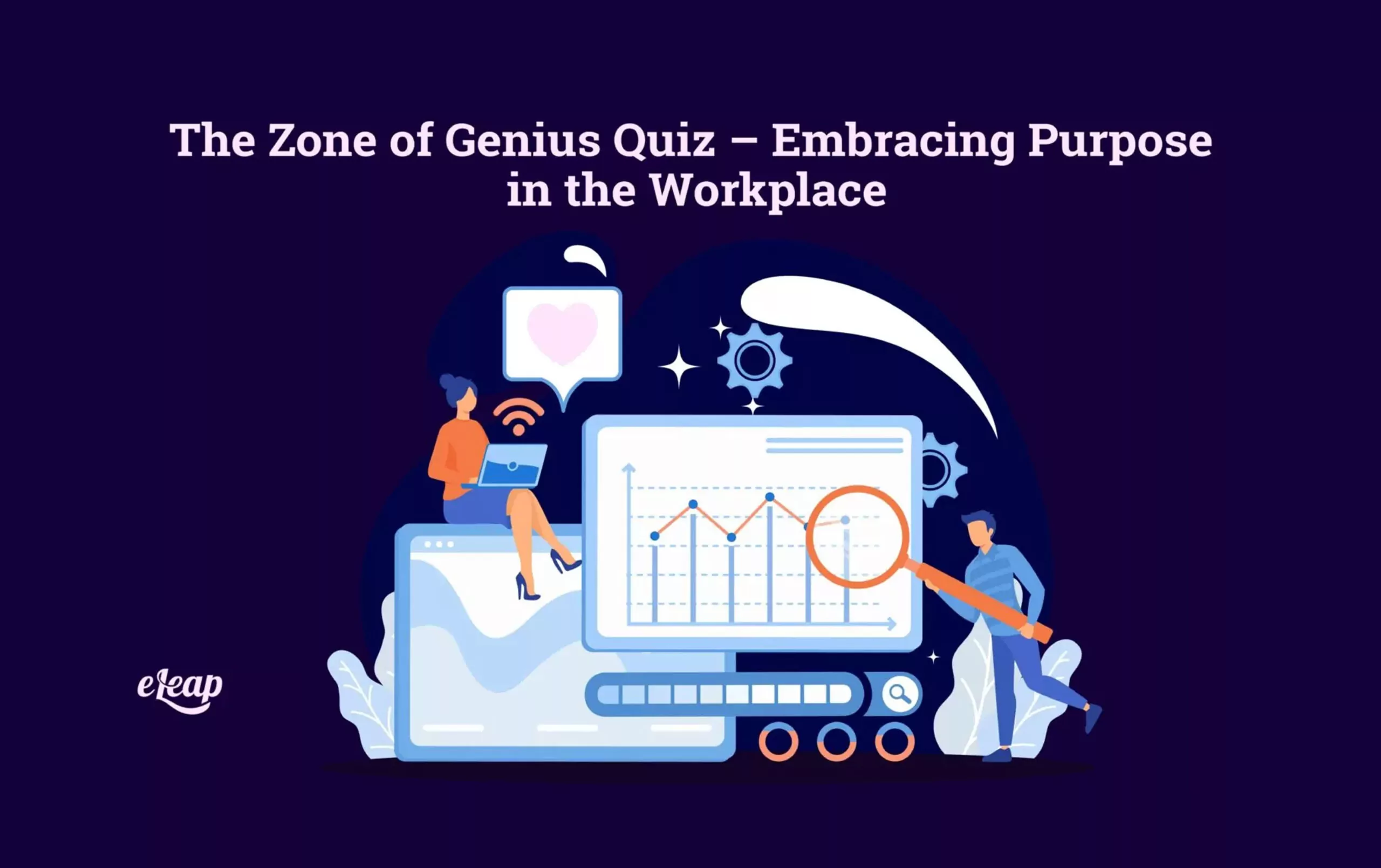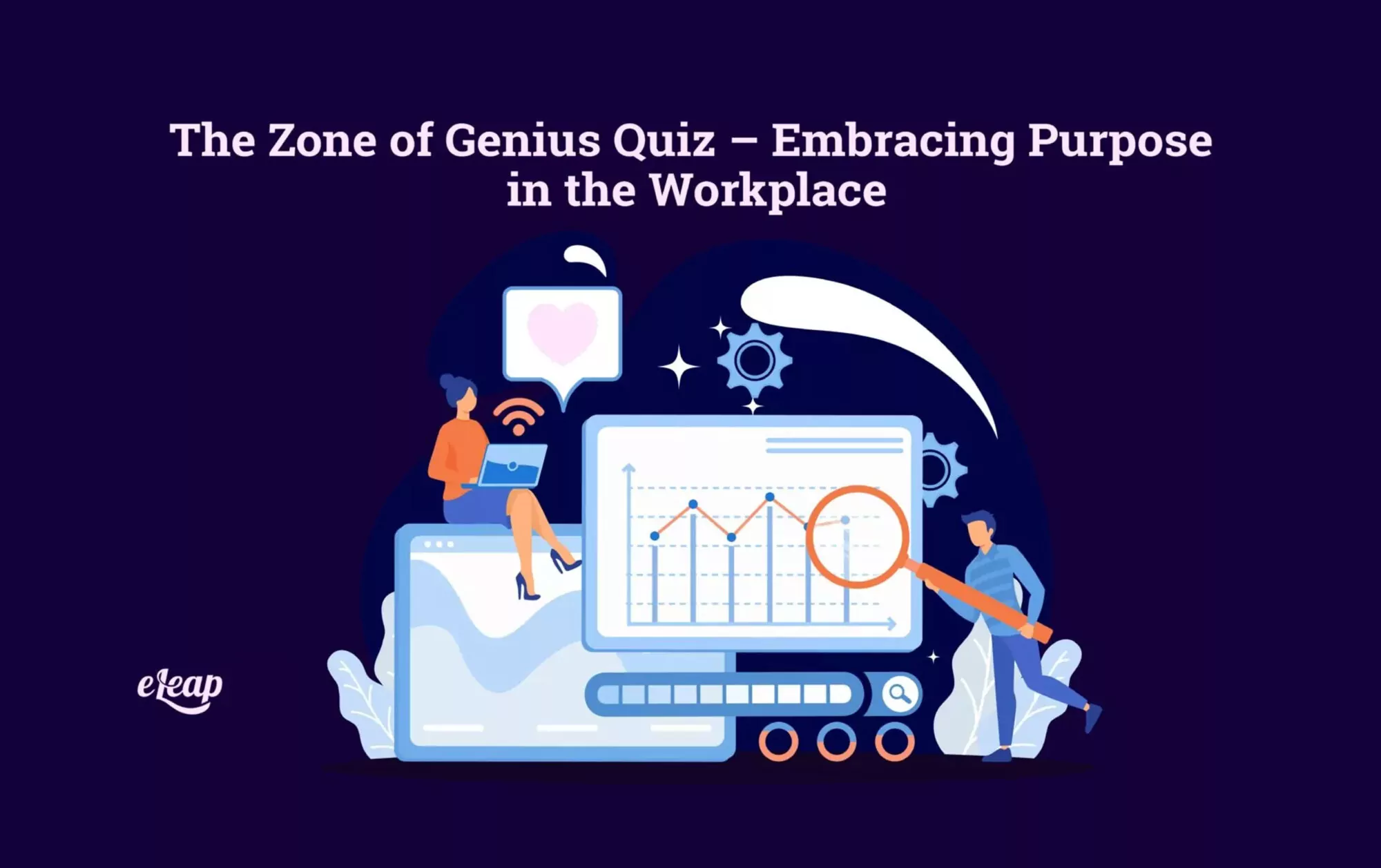The Zone of Genius Quiz – Embracing Purpose in the Workplace

The “Zone of Genius Quiz” is standard language among leadership experts. It is essentially a tool that companies utilize to help employees, and themselves, understand how to embrace their natural abilities and personal purpose as a path toward fulfillment and lasting satisfaction in the workspace.
Statistics consistently show that people around the world are unsatisfied with their jobs. The global pandemic fueled one of the largest job migrations in history, with a record number of people leaving jobs and careers that they feel have gone stagnant. But for a lot of us, simply quitting a career we’ve worked long and hard to get seems like a certain mistake.
The good news is that people can find satisfaction in their current job roles without abandoning ship. And according to experts, everyone has an innate ability to find fulfillment by taking advantage of the unique talents which they already possess.
What Is the “Zone of Genius”?
The term “zone of genius” was coined by author and psychologist Gay Hendricks in his best-selling book, The Big Leap. On the website for his foundation, The Hendricks Institute, the author outlines how we must each take the leap to find our zone of genius.
Hendricks describes your zone of genius as the combination of those innate gifts that each person possesses and the practiced skills and strengths in which people excel. Furthermore, he says that we each have a responsibility to ourselves, and the world, to not only find our zone of genius but make a concerted effort to live and work there as often as possible.
Simply put, your zone of genius is that place where you can exist and flourish to the best of your ability. In it, you use the unique strengths and skills that belong only to you and combine them with the skills and knowledge that you have practiced and learned over the years.
Basically, it’s your sweet spot where time seems to stand still, and you complete a task with a complete feeling of satisfaction, exhilaration, and the desire to keep going.

The Missing Zone – Why We Fail to Recognize Genius
For leaders and executives in charge of a team of employees, understanding and harnessing the zone of genius benefits everyone under the umbrella of an organization. When managers and HR executives seek to hire workers to fill a position, they often look for a specific skill set, proven knowledge and experience, and qualities that suggest a person can become proficient in their role.
While these are important questions for a hiring manager to ask, once employees become a part of an organization, their talents and “genius” are better harnessed if leaders make a concentrated effort to help them:
- Discover their zone of genius
- Give them every opportunity to operate within their zone.
Doing so results in happier and more engaged employees, leading to greater success for everyone.
Understanding the Four Zones and Identifying Where We Exist Now
In The Big Leap, Hendricks outlines four distinct zones where people tend to operate. Each is distinct and understanding the zone we exist in now helps us figure out how to graduate to our zone of genius. Hendricks’ four zones are listed below.
Zone of Incompetence
This zone occurs when people are placed in positions they don’t possess the skills or knowledge to perform successfully. Typically, this is a direct failure of employers not utilizing hiring techniques correctly or failing to provide vital training and onboarding for new employees.
Zone of Competence
Competence means that you perform a skill sufficiently to be considered acceptable but comes with the understanding that your performance is simply passable and not exceptional. It’s important to note that a great percentage of employees operate in this zone, whether intentionally or not.
Perhaps it’s the fault of the employer who has failed to give the employee motivation or reason to want to perform better. If simply “acceptable” is enough, and there is no incentive to reach higher, then employees struggle to find reasons to want more for themselves.
Zone of Excellence
This is the zone where Hendricks says most professionals exist. They have perfected their skills and knowledge to the point where they stand out from the crowd, performing tasks and job roles with exceptional skill and success. For many people, being referred to as “excellent” may seem like a win. In essence, it is.
Performing at this level brings great security, both personally and professionally. The problem comes when the shine of that new career or position wears down, and people are left feeling like something is just missing. It’s a success that is simply unsustainable.
Zone of Genius
This level of performance is where we should all strive to be. It exists at the intersection of innate, natural abilities and individual purpose. While Hendricks points out that our zone may not be where we expect it, or even where we wish it was, it is the place where we are most likely to feel that sense of fulfillment. Operating in the zone of genius gives us a reason to want to show up to work every day.
The feelings we get from operating inside our zone of genius never expire, wear thin, or become boring. This is because they involve those things that drive us and give us a real reason, and purpose, for being.
The Benefits of Your Employees’ Genius
Business success often boils down to a few key factors:
- Productivity
- Growth
- Profit
It is tempting for leaders to look at the world through profit-colored glasses and only see dollar signs pasted over every scenario. However, leaders must understand that focusing on things that seem secondary to the core principles of revenue and loss boosts employee performance and productivity. Thereby, it enhances the success of an entire organization.
Most employers understand these principles to a certain extent. That’s why organizations put so much importance on things such as:
- company culture
- incentives
- perks that boost their employees’ physical and mental well-being
The one thing many organizations glaze over, though, is the importance of placing the right people in the right place.
Many organizations hire employees to fill a specific role and then provide training and education resources to help those employees learn how to successfully perform within those positions. But what they’re missing is the understanding of each employee’s unique zone of genius.
One employee might be a superstar in a specific job role. However, if performing that role day after day results in burnout, stress, anxiety, and—ultimately—quitting, then what was the point of the entire exercise?
The Benefits of Genius within an Organization
Organizations do much better by learning the innate talents and natural abilities of everyone within their organization. Then, they take steps to position those people where they best express themselves and their genius.
Companies gain significant benefits, both long-term and short-term, by exploring and supporting each employee’s unique genius, including:
- Increased employee satisfaction
- Higher employee engagement
- Improved team engagement
- Improved retention rates
- Access to employees’ creativity and ideas
- Improved communication
- Higher productivity
- Increased ROI
The Zone of Genius Quiz
The phrase “zone of genius” is widely used in the business world. Numerous leadership coaches and counselors adopted it to describe the importance of finding personal fulfillment in the workplace. However, a great majority of people have no clear idea of how to discover their zone.
Hendricks suggests using a series of questions that help individuals assess their desires, strengths, and interests. The goal is to understand that their genius already exists, even if they may not be immediately aware of it.
Hendricks refers to these as “the wonder questions.” We’ve summarized them below:
- What is the thing you love to do the most—the things you enjoy so much they don’t even feel like work?
- What is it that you do in your role that produces the best results versus time spent?
- Which unique abilities do you possess that add value; those things that others seek you out for help with?
- When are you at your best, and what are you doing when you feel this way?
- What is it that you love most when you feel at your best?
The answers to these questions may not come easily, but self-reflection and deep thinking lead individuals to analyze their own unique, possessed talents. It helps them figure out their true purpose. Combining these two factors is the secret to figuring out someone’s zone of genius.
Leaders and executives should take the time to answer these questions for themselves. Then, have one-on-one conversations with each employee to guide them toward their personal zones. When everyone in an organization seeks to facilitate and support each other’s genius, the team opens doors that perhaps they didn’t even notice were available.
Conclusion
If all this talk seems very deep and metaphorical, well, it is. But the simple explanation is this. For us to feel fulfilled in our lives, both personally and in a working environment, we need to find a balance between:
- What we were “born to do”
- What we love to do
- What we do well
Leaders within an organization should make every effort to achieve the same kind of revelation for their employees.
So, what’s stopping you from making the “big leap” and discovering your secret to happiness and continued success? The time is now. Your genius is waiting.